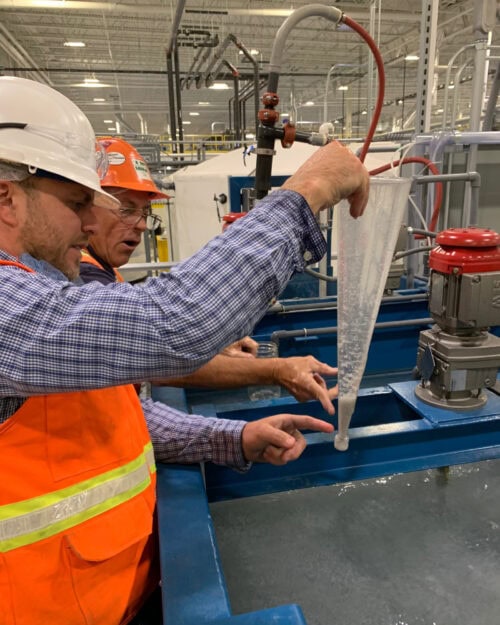 Increased regulatory pressures are driving many industries to rethink their wastewater management strategies. These regulations aim to restrict the discharge of untreated water that can harm the environment and human health.
Increased regulatory pressures are driving many industries to rethink their wastewater management strategies. These regulations aim to restrict the discharge of untreated water that can harm the environment and human health.
However, finding a cost-effective solution can be challenging. Some companies turn to third-party water hauling companies to transport and dispose of their wastewater, while others consider onsite treatment options.
Multiple factors contribute to the complexity of wastewater management strategies. Read on to learn more about the pros and cons of each approach to make a more informed decision.
Offsite Wastewater Treatment
Treating wastewater offsite involves hauling it to a third-party facility for treatment and disposal. This method eliminates the need for on-site equipment installation and maintenance.
However, this convenience comes at a cost. Industries with difficult-to-treat wastewater or those located in remote areas often face significant expenses. In many cases, hauling wastewater is more expensive than installing an onsite water treatment system.
Weekly pickups can lead to substantial expenses. Companies must consider the long-term costs of offsite treatment and explore alternative solutions that reduce waste management costs effectively.
Onsite Wastewater Treatment
If you have been using a water hauling service from a third-party service provider, chances are your costs have dramatically increased over the last few years. Fuel, labor, and high effluent treatment standards are vital in these cost increases.
Regardless, the costs will continue to rise due to increasing cost for fuel and labor. Fortunately, several other water treatment options are much more economical and efficient.
How Does Onside Wastewater Treatment Work?
Onsite industrial wastewater treatment involves treating wastewater at the source by using various technologies tailored to the specific contaminants present in the water. This approach can provide a cost-effective solution for many organizations.
Businesses can avoid the high costs of hauling and disposing wastewater by installing a water treatment system on-site. At Anguil, we offer customized onsite industrial wastewater treatment solutions that help companies reduce their environmental impact and unlock massive cost savings over time.
How We Determine the Best Treatment Approach
We follow a thorough process that starts with understanding the needs and wants of your organization in the terms of onsite treatment. This starts with the discharge standards that need to be met and analyzing the wastewater chemistry of their wastewater. This information helps us identify different approaches that can potentially treat the water to meet the required standards.
Lab Trials and Clarification Equipment Options
We then conduct lab trials to validate the treatment efficacy of the proposed approaches. This helps us identify the most effective method for removing impurities from the wastewater. From the lab trials, we will generate a report on the viability of the treatment approaches, and provide some pros and cons based on the previous needs and wants the client communicated. This allows the client to have all the critical information to make the most informed decision to benefit their company.
Meeting Rigorous Standards
In some cases, rigorous discharge standards may require additional polishing techniques to meet the discharge standard. This could involve leveraging secondary treatments like Ion Exchange (IX), carbon, or other methods depending on the contaminant that needs further treatment.
Benefits and Considerations
The benefits of treating water on-site include reducing costs over time. Additionally, some clients end up reusing the treated water within their own processes. This can also save money and meet certain community goals a company may have, but that is something each firm would need to determine. However, this approach involves an initial investment in equipment and ongoing operational expenses. Anguil can help you determine the capex and opex to help you determine if onsite treatment is right for your organization.
Cost Implications
Choosing between onsite and offsite wastewater treatment requires careful consideration of financial aspects. Onsite treatment involves an initial investment in equipment installation.
Off-site treatment requires ongoing hauling and disposal expenses that increase over time due to fuel and labor. A thorough comparison of these expenses is vital to determining which option best suits your business needs.
Regulatory Requirements
Both onsite and offsite wastewater treatment options come with regulatory requirements that must be met. Onsite treatment requires businesses to comply with regulations, including obtaining permits and ensuring discharge standards are met.
Offsite treatment providers typically handle these responsibilities, but businesses must ensure that the provider complies with regulations. The main difference lies in who is responsible for compliance: the business itself for onsite treatment or the offsite treatment provider.
Treating Wastewater with Anguil Environmental Systems
The Anguil team consists of over 40 engineers and technical personnel. Additionally, we have a support team of 70 operational and field service members who work together to provide air and water treatment systems that meet your specific needs.
Anguil is your single-source provider for designing, developing, integrating, installing, and servicing your treatment systems to meet your regulatory or reuse requirements. We deliver customized solutions that effectively address unique challenges and produce results.
Our Simple & Effective Approach
Our project development steps are straightforward, focusing on your needs and decision criteria.
The steps include the following:
Scope: We begin with project assessment, project ROI, benchmarking, and decision process and criteria.
Discovery: In our Discovery stage, we take a comprehensive approach to understanding your wastewater treatment needs. We focus on understanding the discharge standards you need to meet and analyzing the water chemistry of your wastewater. This allows us to present you with different treatment approaches that can effectively treat your wastewater to meet the required standards.
Based on the results, we conduct lab trials to validate the chosen treatment approach and determine its efficacy. Additionally, we offer various clarification equipment options, including slant-plate, DAF, and ballasted-floc, each with its pros and cons. This enables you to make an informed decision about which option best aligns with your decision criteria.
Test: Anguil can provide pilot testing at our facility or even in-situ field testing at your location if further validation is required.
Implement: The process begins once treatment efficacy and pricing have been agreed upon. Anguil can design, build, integrate, install, commission, and train your team on your new wastewater treatment system.
Choose Anguil to Solve Your Wastewater Problems
Complying with regulatory laws about industrial water pollution control can be daunting. However, with the help of Anguil Environmental Systems, you can have a cost-effective in-house solution that will eliminate the need and costs of hiring a third-party service to haul and dispose of your industrial wastewater.
If you have any questions or concerns about our services, please contact us or submit your project specifications today. We’re ready to design and develop a solution to improve your bottom line.
Click for more information on our onsite wastewater treatment solutions.

